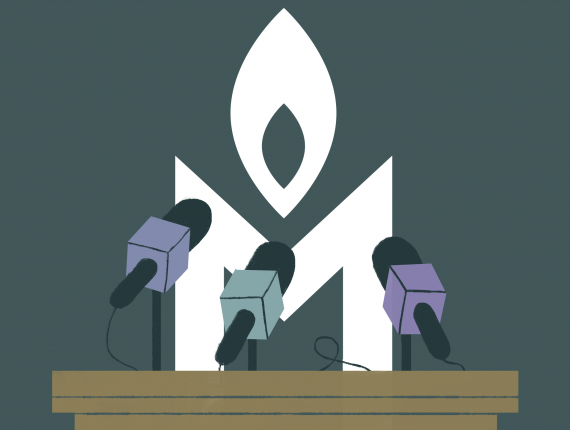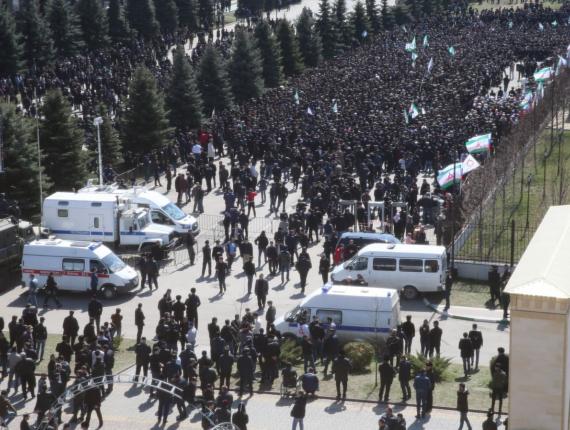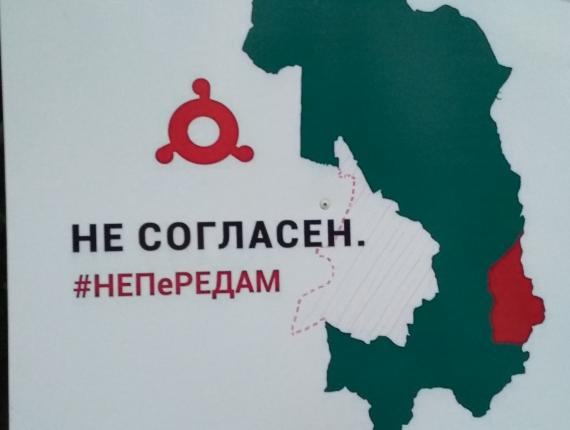On New Charges Laid against Leaders of the Ingush Protest Movement
Statement by Memorial Human Rights Centre
On 27 December 2019 a criminal case was opened against eight leaders of the Ingush protest movement for alleged creation of, and participation in, an extremist group. On January 15 and 16, 2020, On January 15 and 16, 2020, four of them were charged. In the near future it expects the rest.
There is no doubt that the main objectives of those behind this prosecution are to remove the leadership of the protest movement in the republic and to ‘teach a lesson’ to other Russian regions.
In the autumn of 2018, Ingushetia demonstrated to the rest of Russia that protests involving thousands of people over many days can be held peacefully and without any danger to public order. This required the protest organisers and participants to be well organised, disciplined and responsible, and for the republican authorities to show calmness and wisdom. The federal authorities could not tolerate this. Precisely for that reason, when there were fresh protests in Ingushetia in the spring of 2019, a decision was taken to disperse the peaceful rally by force. On 27 March, National Guard officers brought in from other regions were sent to break up the peaceful demonstration. For this same reason, officials from the federal-level Investigative Committee over a nine month period worked to carry out orders to secure convictions of the leaders of the protest movement on charges of ‘organising violence, dangerous to the life or health of public officials.’ But this did not prove to be enough.
Now, based on an official report by police from the anti-extremism department of the North Caucasus Federal District, investigators accuse Malsag Uzhakhov, Akhmed Barakhoev, Musa Malsagov of creating an extremist group (Article 282.1, Section 1, of the Russian Criminal Code, punishable by up to 10 years’ deprivation of liberty), while Barakh Chemurziev, Akhmed Pogorov, Bagaudin Khautiev, Ismail Nalgiev and Zarifa Sautieva are suspected of participating in this extremist group (Article 282.1, Section 2, of the Russian Criminal Code, punishable by up to six years’ deprivation of liberty).
In the official order initiating the criminal investigation, investigator E. Naryzhny asserts that, not later than May 2018, Uzhakhov, Barakhoev and Malsagov, ‘united by political hostility against the then head of the Republic of Ingushetia, Yu-B. B. Evkurov, created an extremist group in order to remove him from office,’ in other words ‘an organised group for the preparation and commission of extremist crimes.’ An ‘extremist group’ was allegedly created for commission ‘of crimes involving the use of force against public officials’ (Article 318, Section 1) and to ‘lead a nonprofit organisation, and also participate in its activities, intended to incite citizens to commit other illegal acts, and also distribute propaganda of such acts’ (Article 239, Sections 2 & 3, of the Russian Criminal Code) ‘motivated by political hatred.’ The official order to open the criminal investigation does not directly identify the non-profit organisation concerned, but repeatedly mentions the Council of Teips of the Ingush People.
According to the investigator, Chemurziev, Pogorov, Khautiev, Nalgiev, Sautieva and other persons were among those who ‘at various times were members of the extremist group.’ Moreover, ‘the extremist group engaged in the planning, preparation and organisation of large-scale public events, including those without official permission, the creation of video appeals to an unlimited number of people, including residents of the Republic of Ingushetia, and distribution of these videos on the Internet, the incitement of citizens to commit illegal acts and obstruction of the lawful activities of public officials.’
As examples of ‘criminal acts’ the investigators cite:
— the call by Uzhakhov and others to hold a rally on 4 October 2018 without official permission;
— the video appeal of Barakhoev demanding that deputies of the People’s Assembly of Ingushetia take part in the Sharia court on 15 December 2018;
— the participation of Barakhoev in the ‘illegal Sharia court initiated earlier,’ at which Barkhoev expressed dissatisfaction with the signing of the agreement establishing borders between the Republic of Ingushetia and the Republic of Chechnya, and also described the decision of the Constitutional Court of Russia on this agreement as unlawful. ‘Subsequently, taking advantage of the bewilderment of the deputies of the People’s Assembly who came to the Sharia court and who feared public disapproval, in the situation they had created forced the latter to make public how each had voted in the secret ballot, and in that way allowed unlawful pressure to be put on the deputies of the People’s Assembly, in practice propagandising their illegal acts.’ As a result, ‘in Ingush society a deliberately false but firm opinion was created that the signing of the agreement and the ruling of the Russian Constitutional Court were unlawful, resulting in a reduction in the authority of the executive and judicial authorities of the Russian Federation in the eyes of residents of the Republic of Ingushetia, as well as widespread discontent in the Republic and social tension’;
— the declaration by Uzhakhov, Barakhoev and Malsagov to participants in the legal rally of 26 March 2019 that ‘the rally would continue indefinitely,’ and also that ‘B. A. Chemurziev, A. S. Pogorov, B. A Khautiev, I. M. Nalgiev, Z. M. Sautieva and others […] distributed false information that they would soon receive permission to extend the rally.’
The new criminal case against individuals, most of whom (Barakhoev, Malsagov, Nalgiev, Sautieva, Uzhakhov and Chemurziev) have already been declared organisers of ‘violence, dangerous to the life or health of public officials,’ is nothing other than a recognition of the absurdity and flimsiness of the charges laid earlier. After all, on the morning of 27 March 2019, during an unprovoked and brutal use of force to disperse a peaceful protest, irresponsible actions by the authorities resulted in violent clashes, while on the contrary it was the protest leaders who then stopped the escalation of the violence.
In connection with the clearly groundless and politically motivated charges under Article 33, Section 3, and Article 318, Section 2 (organising violence, dangerous to the health of public officials) of the Russian Criminal Code, Memorial Human Rights Centre has already long ago recognised A. Barakhoev, M. Malsagov, I. Nalgiev, Z. Sautieva and B. Chemurziev as political prisoners. The new criminal case does nothing to change our opinion. The approach set out in the official decision opening the investigation criminalises lawful public activity. Normal interaction among people, simple self-organisation and cooperation among citizens is described as the distribution of roles in the framework of an ‘extremist group.’ People, identified among the protest participants as having a particular public influence, were declared to constitute an ‘organised group of persons for the preparation or commission of crimes of an extremist nature.’
As we have already indicated, from the criminal case and other accessible materials it evidently follows that the leaders of the opposition did not organise acts of violence and the charges laid against them under Article 33, Section 3, and Article 319, Section 2, of the Russian Criminal Code are groundless. All the more, calls for the peaceful realisation of the right to freedom of assembly (Article 31 of the Russian Constitution), for the power of the people (Article 2 of the Russian Constitution) and for the participation of citizens in the administration of state affairs (Article 32 of the Russian Constitution) cannot possibly be considered incitement to commit illegal acts.
Memorial Human Rights Centre considers the new criminal case opened against Malsag Uzhakhov, Akhmed Barakhoev, Musa Malsagov, Barakh Chemurziev, Akhmed Pogorov, Bagaudin Khautiev, Ismail Nalgiev and Zarifa Sautieva unlawful and politically motivated. This is the latest step in the suppression of lawful civil society activity and of the rights and freedoms, not only of those who live in Ingushetia, but of all Russian citizens. We demand an end to the unlawful prosecution of the participants in the protests in Ingushetia.
Поделиться:
- ВКонтакте
- РћРТвЂВВВВВВВВнокласснРСвЂВВВВВВВВРєРСвЂВВВВВВВВ
- Telegram




